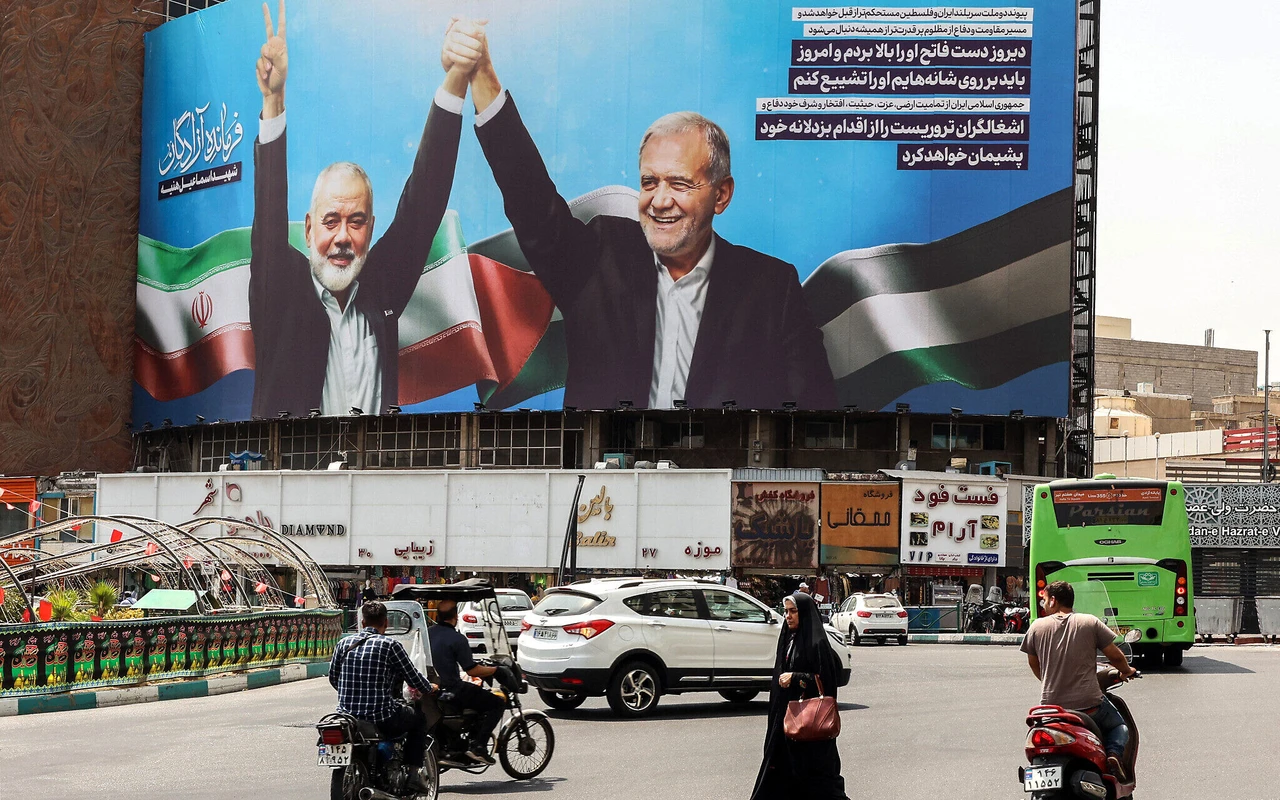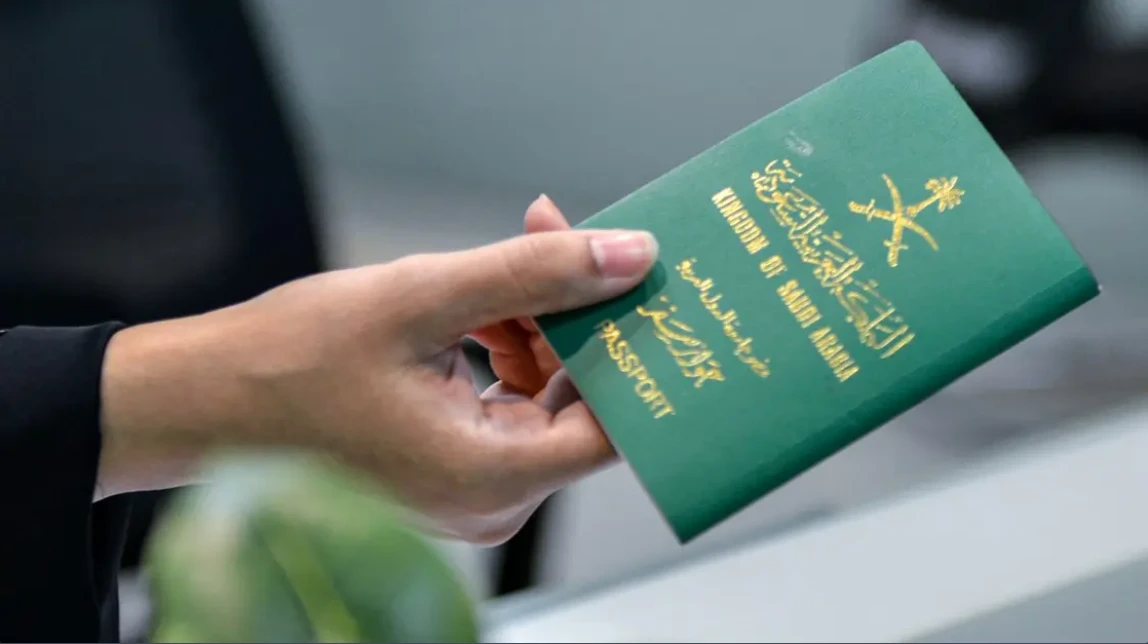Iran says Haniyeh assassinated by short-range projectile, contradicting int’l reports
 A woman walks amids vehicles next to a billboard of Iranian President Masoud Pezeshkian (R) and late Hamas leader Ismail Haniyeh at the Valise square in Tehran, on August 1, 2024. (AFP Photo)
A woman walks amids vehicles next to a billboard of Iranian President Masoud Pezeshkian (R) and late Hamas leader Ismail Haniyeh at the Valise square in Tehran, on August 1, 2024. (AFP Photo)
The assassination of Hamas political bureau leader Ismail Haniyeh in Tehran has set off a geopolitical firestorm, with Iran’s Islamic Revolutionary Guard Corps (IRGC) accusing Israel of orchestrating an attack backed by the United States.
The IRGC revealed that a short-range projectile with a 7-kilogram (15.4 pounds) warhead was used in the killing, causing significant destruction at Haniyeh’s residence.
Assassination plot
- IRGC report: Iran’s Islamic Revolutionary Guard Corps (IRGC) announced that Haniyeh was killed in Tehran on Wednesday by a short-range projectile with a warhead weighing approximately 7 kg, causing significant devastation to the guesthouse. However, this narrative has been contradicted by international reports suggesting an internal explosive device.
- Remote-controlled bomb: The New York Times reported that the explosion was caused by a sophisticated, remote-controlled bomb that was smuggled into Haniyeh’s room approximately two months prior. This aligns with the timeline when Haniyeh visited Tehran for the funeral of the late Iranian president Ebrahim Raisi in May.
- Mossad’s role: According to The Telegraph, the Mossad spy agency orchestrated the assassination by enlisting agents from within Iran’s Revolutionary Guards to plant explosives in the Tehran guesthouse where Haniyeh was staying. Surveillance footage reportedly shows these agents discreetly moving between rooms, planting bombs in three different locations before leaving Iran. “They are now certain that Mossad hired agents from the Ansar al-Mahdi security unit,” said an official in the Islamic Revolutionary Guard Corps (IRGC).
Zoom in: weapons analysis
Several weapons match the projectile’s description. According to a list compiled by Anadolu, options include:
- The Russian-made RPG-7, weighs approximately 6.3 kg with a range of 330 to 700 meters.
- The US-made M72 LAW, weighs 2.5 kg with a range of 200 meters.
- The Swedish AT4, ranges from 6.7 kg to 8 kg, with an effective range of up to 2,100 meters.
- The Israeli-made B300, weighs 8 kg when loaded, with a 400-meter effective range.
Arrests, investigations
- Tehran’s crackdown: Iranian authorities have reportedly arrested at least two dozen individuals, including senior Iranian intelligence officers, military officials, and staff at the IRGC-run guesthouse. The New York Times cited two Iranians familiar with the investigation, noting that the Revolutionary Guards Corps’ specialized intelligence unit for espionage is leading the probe to uncover the assassination team’s identities.
- Security breach: An IRGC official described the incident as a “humiliation for Iran and a huge security breach,” acknowledging that a team was working to minimize the perception of the breach. “There must be something higher in the hierarchy that no one knows about,” he added, indicating the potential involvement of senior insiders.
- Delayed operation: The Telegraph report mentioned that the initial plan was to assassinate Haniyeh during his visit to Tehran in May for Raisi’s funeral. However, the operation was postponed because of the large crowd and the high risk of failure. Instead, the agents strategically planted explosives, detonating them remotely during Haniyeh’s recent visit to Tehran for the inauguration of new Iranian President Masoud Pezeshkian.
What they’re saying
Haniyeh’s assassination followed his attendance at the inauguration of newly elected Iranian President Masoud Pezeshkian, a significant event that drew many international figures to Tehran.
Iran: The IRGC emphasized that the assassination was “designed and executed” by the “terrorist Zionist regime”Israel and supported by the US, labeling it a “terrorist crime.” They promised that “the warmongering and terrorist Zionist regime will receive harsh punishment at the suitable time, place, and capacity.”
- Iran’s military posture: Iranian Supreme Leader Ali Khamenei has reportedly ordered a direct strike on Israel following the assassination, emphasizing that addressing the security breach is a priority over immediate retaliation. “No intact brain can accept that this happened by accident, especially on Mr. Pezeshkian’s first day in office,” a source close to Pezeshkian remarked.
Israel: Israel has not officially commented on Haniyeh’s assassination. However, IDF Spokesman Rear Adm. Daniel Hagari clarified during a press conference that there was no Israeli airstrike in the Middle East at the time of the assassination, except for the targeted operation against Hezbollah military chief Fuad Shukr in Beirut.
We struck on Tuesday night in Lebanon and killed Fuad Shukr in an accurate aerial strike. I want to emphasize, there was no other aerial strike, not a missile and not an Israeli drone, in the entire Middle East that night, and I won’t comment further,
Daniel Hagari
- IDF’s preparedness: The IDF has stated that it is on “high alert” and ready to handle any threats, as the region braces for potential retaliatory measures from Iran and its allies.
United States: President Joe Biden, when asked about the situation, responded, “I hope so. I don’t know,” regarding whether Iran would refrain from retaliatory actions. The administration has emphasized its commitment to defending Israel against potential attacks. “We are prepared to respond if necessary,” a Pentagon spokesperson stated, highlighting the U.S.’s readiness to support its ally.
Iran-Israel dynamics
Political dynamics: Iran does not recognize Israel and continues to support anti-Israeli militant groups, including Hamas and Lebanon’s Hezbollah. The enmity between the two nations dates back to Iran’s 1979 Islamic Revolution, with both sides engaging in proxy battles across the region.
April’s tensions: In April, Iran launched hundreds of missiles and drones at Israel, marking the first time Iran had directly attacked Israel despite decades of hostility since the 1979 Islamic Revolution. Israel reported intercepting 99% of the missiles. The attack followed suspected Israeli strikes in Syria that killed two Iranian generals.
Ongoing hostilities: The assassination has reignited fears of a confrontation between Iran and Israel, given the volatile situation in Gaza and the escalating conflict in Lebanon.
US involvement
Allegations of complicity: Iranian and Hamas officials have accused the United States of approving the Tehran hit. The Pentagon responded by announcing the deployment of a fighter jet squadron to the Middle East and maintaining an aircraft carrier in the region to defend Israel from potential attacks by Iran and its proxies.
US commitment to defense: In April, a U.S.-led coalition intercepted dozens of missiles and drones fired by Iran against Israel, showcasing the U.S.’s ongoing commitment to defending its ally against regional threats.



